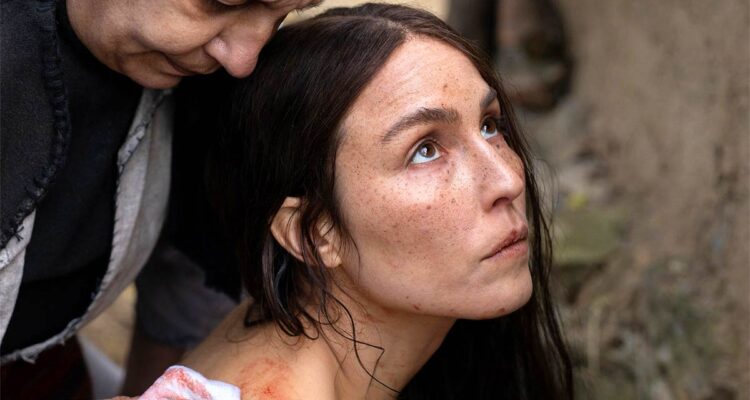In Macedonia, there’s a legend about a bitter, lonely crone named “Old Maid Maria.” She wanders the woods in search of vulnerable newborn babies ripe with blood to feed on, allowing her to remain alive. In the opening of Goran Stolevski’s gruesome fairytale horror story, “You Won’t Be Alone,” Old Maid Maria (Anamaria Marinca), a menacing body of scar tissue and wispy gray hair, comes upon baby Nevena. To spare the child’s life, her anguished mother makes a vow to Maria: If she allows Nevena to live, when the girl turns 16, she can have her as a surrogate daughter. Once freed, the mother flees with Nevena to a holy cave in the hope of keeping her there for protection for the rest of her life.
Infusing Terrance Malick’s visual and narrative storytelling language with Macedonian folklore, in “You Won’t Be Alone,” Stolevski aims for a life-affirming treatise on the poetics of human existence but strains to be more than a pretty copy of his well-known influences.
Sundance 2022 Preview: 20 Must-See Movies From The Festival
His homages take shape in the opening: Nevena (Sara Klimoska) is now 16-years old. A muddy human tumbleweed of leaves and twigs, the mute girl prances around her home, this homely holy cave, with dreams of experiencing the outside world. We know this because while Nevena can’t audibly speak, a voiceover of her inner-monologue, a fragmented array of evocative phrases that impart feeling more than strict meaning, guides us along the way. The narration is a Malick tool of the trade that’s rendered far more allusive, far more frustrating, and devoid of resonance here than in his work.
Stolevski, with a film that moves at a drowsy pace, is lucky to have a cadre of dependable, fully committed actresses holding up his work. Klimoska, in particular, radiates energy, ebullience, and restlessness in her every movement. When fresh snowflakes begin falling through the cave’s ceiling, her exuberant dance, a moment of full bliss, feels all the more childlike because Klimoska never gives a false, self-conscious note. However, despite her mother’s best efforts, this will not be Nevena’s existence for long. Maria comes to collect the girl, using her witching spit to make the teenage girl a wolf-eateress.
Maria tries to teach her new apprentice the ropes. But Nevena is just too damn innocent. She sees bunnies as pets. Not as clumps of nourishing blood hidden underneath adorable fur. Trigger warning: Animal gore is a focal point of “You Won’t Be Alone.” And it never abates. While that works, for a time, even within the practical confines of the concept, it can come off as gratuitous as guts are strewn across rocks, and as Maria leans her face into a fallen cow, eating out his bloody insides for a meal.
It’s no wonder why Nevena can’t hang with Maria. The wolf-eatress leaves the girl to fend for herself. During her travels, Nevena comes across several human villages. A pattern soon forms: She kills a community member, usually in self-defense, and shapeshifts into their respective body. Recalling Walt Whitman: What they assume she shall assume. In her first settlement, she becomes a peasant named Bolsikia (Noomi Rapace). Through her, she observes the brutal environment these women inhabit as workers, mothers, and objects of sexual control for their abusive husbands.
Rapace is equally as evocative as Klimoska but somehow far more alien. Nevena is an outsider, and without the ability to speak, it’s difficult for her not to be othered. Nevertheless, she’s always observant, always mimicking, which allows an envelope-pushing performer like Rapace plenty of latitude to imbue depth into Nevena through a gentle physicality.
Eventually, Nevena becomes a simple country boy, and then takes the identity of a young country girl. Each perspective offers a new kind of experience, a new kind of love: Whether it’s sexual, maternal, or romantic. In these rolling country spaces, patches of green hills and valleys, Malick’s fingerprints cover nearly every inch of every frame of DP Matthew Chuang’s work (and even some of the same Hanan Townshend hymns, the composer wrote for Malick’s “The Tree Of Life” are utilized). Around every corner, Chuang and Stolevski, through intimate compositions capturing nature: verdant green fauna and tranquil streams — reach for the transcendent. But his strained approach lacks the naturalism required to imbue the mundanity of simple, repetitive human actions with the poetic grandeur he intends.
Nevena’s desire to reach humanity, wherein she might be surrounded by people who care about her, in a way she’s never been cared about, is at a distance. Because the measurement of the heart isn’t defined by the proximity of the camera. It’s told through the connections that are shown. Maria can’t help but warn Nevena, sometimes gleefully, how these humans will never accept her. They will burn her at the cross because that’s what society does to powerful women. But the hurt Maria feels, the real ways she misses Nevena are steeped in mythology more than actual interactions.
Whenever the narrative demands that Stolevski be more specific with Nevena’s unique emotions, he falls back on either folklore or elusive montages to fill the gaps under the guise of universality. In a narrative specifically about women navigating a patriarchal hierarchy, reaching for the universal will usually come up short. And it does here to unfortunate degrees, leaving one cold. Visually enthralling, but never wholly invested in Nevena’s arc. In that sense, Stolevski’s “You Won’t Be Alone,” gory, grisly fairytale, contains far too many multitudes. [C+]
Follow along with all our coverage of the 2022 Sundance Film Festival.

